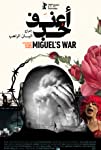Eye For Film >> Movies >> Miguel's War (2021) Film Review
Miguel's War
Reviewed by: Jennie Kermode

How does one speak to the story of a nation? Lebanese history in the latter part of the 20th Century was full of pain and fragmentation. The years of civil war, the Israeli occupations, the tensions surrounding the Syrian military presence. Eliane Raheb has made a series of documentaries which touch on these experiences, but here she tackles the subject of what it means to be Lebanese more directly through the story of a man who left the country 37 years previously for a self-imposed exile in Spain. Returning to his homeland in her company, Miguel Jleilaty reflects on his personal traumas and key elements of the country’s story unfold along the way.
This Teddy Award-winning documentary, screening as part of Newfest 2021, goes far beyond the familiar biographical documentary model in both content and style. The interviews mainly take place in Beirut or in Miguel’s adopted home of Barcelona, and are full of little observations about those places. Like a therapist, Raheb challenges Miguel to roleplay key scenes from his past, with actors playing the other parts, and invites him to explore what he really wants to say or do in those situations. She links scenes with animation and fantastic collages which draw us into a surreal landscape influenced by dreams, as well as using archive footage in more conventional ways. The result is a rich, multifaceted piece of work addressing the complexity and contradiction of the human experience as well as that of human collectives, of cities.
Sometimes enthusiastic, sometimes reluctant, at one point threatening to walk away, Miguel is a highly engaged and engaging subject. The interview segments of the documentary were filmed over two years and Raheb makes no secret of the friendship that developed between them, setting aside the myth of pure objectivity and exposing her working process so that viewers can measure any bias for themselves. This openness about their interactions leads to further insights into character, and we see Miguel change over the course of the film, gradually becoming more comfortable with himself. Is this a result of that friendship, or of the filmmaking process itself, or is he still undergoing a more long term healing process, having left the primary sources of his trauma behind all those years ago?
Multiple traumas are addressed here. Familial rejection, with his mother always making a point of how his brother was her favourite child. Having to fight in the war, and the awful things he saw there. And the more generalised harm done by growing up as a gay man in a deeply homophobic environment. So long categorised as other, as exotic in themselves, gay men have rarely been centred in stories in this manner, and there’s something quietly revolutionary about situating Miguel’s sexuality as one of the few still points which other events here whirl around. Raheb finds a tragic note in the fact that his prodigious sex life has done nothing to help him find love, but the sex itself is treated neutrally, with reference made to bad experiences and good ones. If there’s a problem, it’s probably in the way that Miguel has depended on it to feel good about himself. Rather than just dissecting her subject, Raheb seems keen to help him reassemble himself in a more positive way. Together they experiment, finding ways to tackle the sources of his ongoing self-abnegation. There’s even a make-over.
Although the film doesn’t dwell much on the war directly, Miguel talks quite a bit about his experiences in the military and his interactions with other soldiers during and after that time. Cultures of bullying are exposed as he reflects on his desire, then, to be bullied, a common response to growing up in an unhappy home. The gaps in his military narratives, the stories he reshapes or claims not to remember, highlight the impact of the war itself far better than any straightforward description might have done. In and around this, Raheb explores the religious framework of his upbringing and how he tried to use it to navigate both his fears and the desires that troubled him; and how hard it can be to hold onto faith when surrounded by death.
At just over two hours, this would be a weighty film by any measure, but the sheer quantity of thought it contains (not least in the rapid fire collages) is something else. It’s a powerful portrait of a person and place, and one of the most impressive documentaries of the year.
Reviewed on: 18 Oct 2021
















